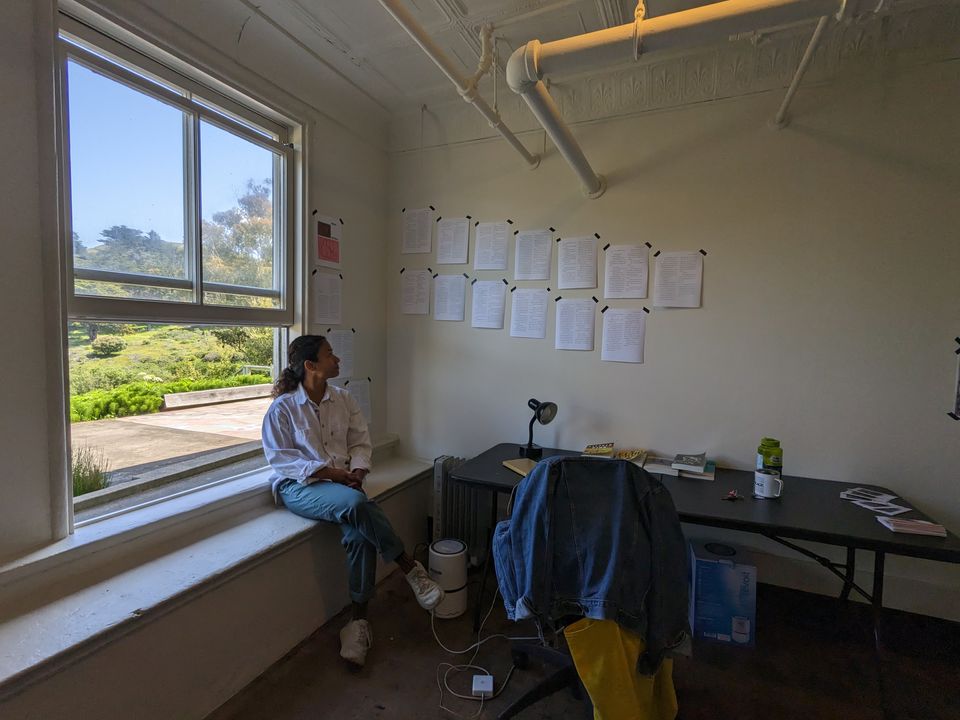May

Hello!
I can't believe it's June. Which is about as useful as lamenting that I can't believe water flows downhill! Time, like water, runs in the direction it does, unless it doesn't, but I suppose we will find that out only once we've broken free of these so-called physical laws. So oppressive! I want to be young again, at least as young as May, so that I can take the lessons I learned at the end of the month and apply them from the beginning.
Here are the lessons of May, if you will have them.
How to be old in art school
I was not old-old at my writing residency at the Headlands Center for the Arts, but "old" can be a metaphor for many feelings and states, from tenacious and very wise to isolated and depressed. I felt many ways and had inhabited many states by the end of my residency, including tenacious, isolated, and depressed (excluding wise). I loved the purpose and focus I was able to harness, writing for hours in my cozy room. I wrote a lot of words. I made progress on a novel I thought was un-progressable. I had fun with stories just for the sake of having fun with stories. I went to SFMOMA and discovered a new favorite artist (Frank Bowling makes BIG art with a lot of COLOR, thus satisfying my two criteria for Art I Like).
Interrupting hours of actual flow state writing (I had begun to think "flow state" was a myth, on par with "meritocracy" or "the market will regulate"), came a full-on onslaught of old insecurities that I thought had lost their real bite years ago. Nourished by the absolute fecundity-in-all-directions of the headlands, it seemed they had grown newer, longer, worse teeth. Am I serious? Am I a real writer? Am I a fundamentally likable? Am I terrible?! Do all other artists hate me?
I do and don't know where these feelings come from. They come from years of having felt (felt, not necessarily been) excluded by my peers; years of questioning (sometimes rightly, sometimes not) my abilities and discipline as a writer; years of being black, malaysian, queer; years of being simultaneously abolitionist-minded and power-seeking; friendly yet distant; highly irritable and very tolerant!
One of my fellow residents, the brilliant and kind historian Nell Painter, recommended that I read her memoir, Old in Art School, about her experience getting her BFA and MFA in painting while she was in her mid-sixties.
Home from my residency, feeling profoundly blocked from accessing words, emotions, or lessons from the past month, I read Old in Art School. And laughed, and laughed, and felt seen and validated, and felt tremendous gratitude to Nell for writing with such care and vulnerability and candor, and felt the beginnings of lessons stirring.
"During my first year of graduate crits, I couldn't tell whether my teachers and fellow students were critiquing me, old-black-woman-totally-out-of-place, or critiquing my work, which was not good enough, TOTALLY NOT GOOD ENOUGH, or, as it felt, completely, utterly, stupidly, rotten.
...Pathetic was precisely how I felt. Even so, misery was not all there was to me in my first year at RISD. Some of what was much more about me than misery was being an old person with a long history in the world. My much more paid off, and handsomely. With a wide circle of contacts outside my art school, I sought education in my own network of support. That network saved my life as an artist." —Nell Painter, Old in Art School

To be black, to be "other" (in Nell's case, black-woman-old; in mine, black-malaysian-queer) in a world whose embrace you both crave and buck against—the art world, the writing world, academia, whatever—can be a ferociously soul crushing experience. It is the aloneness of the experience. It is shame, the shame of perceiving oneself as utterly different, outside-of, less-than.
To be offered a path, a light, a way back to a sense of belonging, of selfhood-amongst-peers, of lovability is wonderful beyond words. Thank you, Nell!
How to end a 3,000 page epic saga
This is connected. As I've mentioned, I spent much of this Spring enjoying myself immensely in reading the entirety of Stephen King's The Dark Tower series. Seven novels, 3,000 pages, many adventures. I loved it. And I loved the ending! I will not spoil it exactly. I will say that the seventh book, The Dark Tower, ends with a poignant reminder that the point of a long quest is always the quest itself, the journey, the process, and never its ending. I know! What a trope, what a cliche!
Lest we assume only writers so crass as Stephen King employ cliches, a note from Toni Morrison:
My stories come to me as clichés. A cliché is a cliché because it’s worthwhile. Otherwise, it would have been discarded. A good cliché can never be overwritten; it’s still mysterious.
One of the sources of my shame, and resultant blockage of emotion, post-residency was the feeling that I have done this all before. I write about shame all the time! And its isolating impacts! I have dealt with these emotions, these stories and truths of belonging and not-belonging. In life, in writing, in other people's lives. I have already processed, and learned from, and done all this already! I should not need to do it again.
Alas. The pleasure and privilege of being old is the chance to know better, to know over and over again, to meet the difficult lessons and attend to the worthwhile cliches forever and ever anon.
Until next time (and next time, and next time),
Endria
P.S. Good news from the earth:
>> Poet, potter, climber Narinda Heng published a beautiful essay about moss in one of my all-time favorite magazines, Bay Nature:
"Before this moment, it hadn’t occurred to me that moss could grow on hard ground. Some of them even displayed delightful, spindly cups bobbing with dewdrops. I had passed many oak trees on the way up the trail, many of their shady-side trunks thickly pelted with moss. Not having a dog with me to pet, I ran my fingers along the moss. Up close, they looked like miniature fern-forests. Boulders harbored the same surprising forests. Lichens often make a home on stone first; as they cling, they release an acidic substance which slowly, microscopically, etches the stone, eroding it just enough for an errant moss spore to take hold. Lichen and moss together begin the process of turning stone into soil, making the stuff from which future forests might grow." —Narinda Heng, Moss Knows How to Wait
>> I published an essay about my forever-quest for stillness in Backpacker:
Stillness does not require solitude, it does not require disconnection, it does not require individual exceptionalism. It is, in fact, the silencing of our anxieties and fears that allows us this most profound and human of revelations: We are not, we are never, we are in fact incapable of being alone. Stillness—that is, happiness—can only be shared. It is in the sharing of ourselves with people, with animals, with land that it arises.
You can read the full essay here.
Member discussion